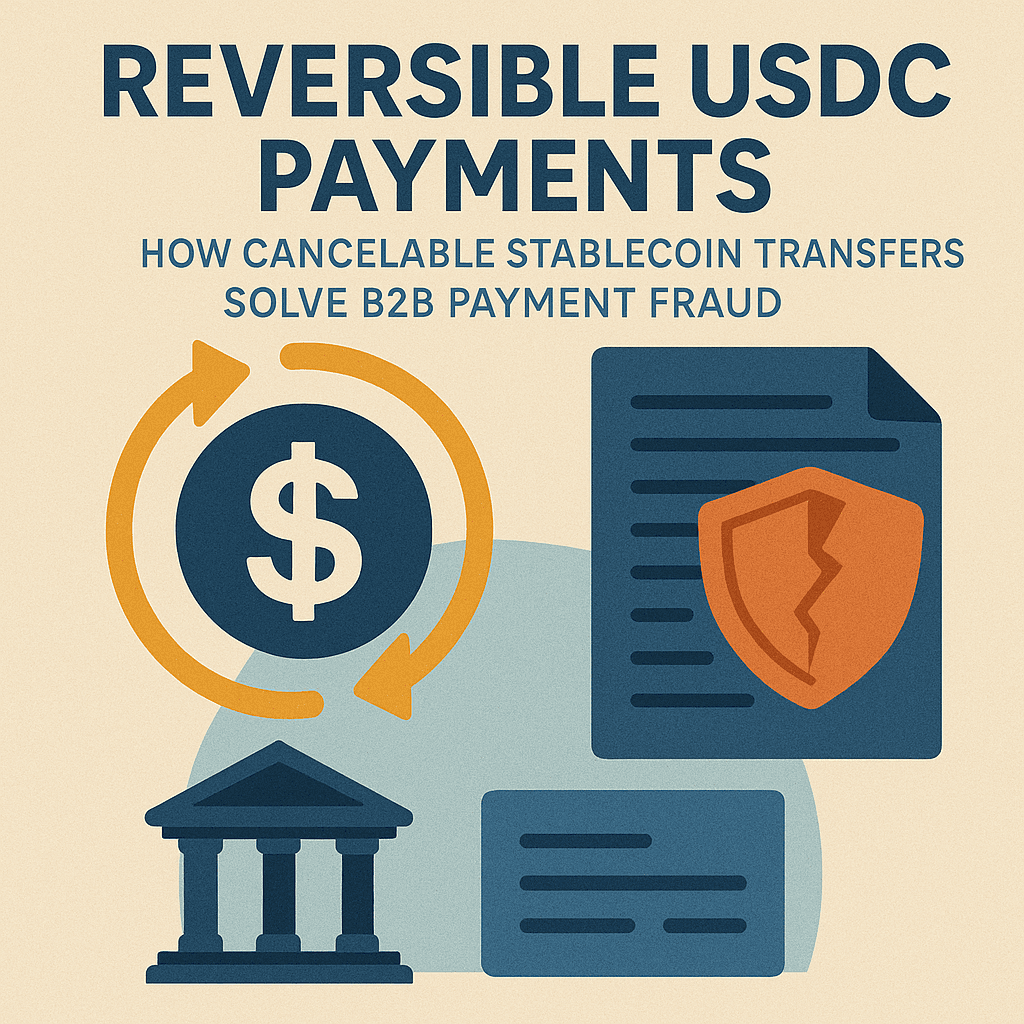The B2B payments crisis is reaching a breaking point. 80% of organizations fell victim to payment fraud attempts in 2023, a 15% jump from 2022, according to the AFP Payments Fraud Survey. Meanwhile, global chargeback volume is exploding toward 324 million transactions by 2028, costing businesses over $41 billion globally.
Traditional payment processors offer no real solution. Wire transfers remain irreversible, ACH payments take days to settle, and even modern fintech solutions lack the programmable safeguards that businesses desperately need.
But what if B2B payments could be instantly reversible, yield-generating, and fraud-proof?
Welcome to the era of reversible USDC payments, the crypto treasury management solution that's transforming how forward-thinking businesses handle money.
The $343 Billion B2B Payment Fraud Problem
Every dollar lost to B2B payment fraud costs businesses $4.61 in total impact - a 37% increase since 2020. This massive multiplier effect comes from:
Direct fraud losses: The stolen amount itself
Operational costs: Staff time investigating and recovering funds
Chargeback fees: $191 average cost per dispute (up from $165 in 2021)
Reputation damage: Lost supplier relationships and credit impacts
Prevention expenses: Ever-increasing security infrastructure costs
The Most Common B2B Payment Vulnerabilities
Business Email Compromise (BEC) Fraud now targets ACH credits more than wire transfers, accounting for 47% of all B2B payment fraud. Here's how it typically works:
Fraudster gains access to supplier email accounts
Sends "updated payment instructions" to paying companies
Business updates their ERP system with fraudulent bank details
Payments flow to criminal accounts instead of legitimate suppliers
Fraud discovered weeks later when real supplier complains
The devastating result? In 30% of fraud cases, businesses never recover their lost funds. Unlike consumer protection laws, B2B transactions offer no safety net, making crypto treasury management solutions increasingly critical.
Why Traditional Stablecoin Payment Processors Fall Short
Current stablecoin payment providers like Bridge, Conduit, and BitPay focus on being "faster, cheaper fiat rails." They compete on settlement speed and ramp fees, but completely ignore blockchain's programmable capabilities:
❌ No reversibility: Once confirmed, transactions are final
❌ No yield generation: Funds sit idle during transit
❌ No conditional logic: No escrows, milestones, or automated safeguards
❌ No fraud protection: Simple send/receive with no smart contract security
❌ No business logic: Payment flows remain rigid like traditional rails
This approach treats stablecoins like digital cash instead of programmable money, missing the revolutionary potential that makes crypto treasury management superior to legacy systems.
How Reversible USDC Payments Work
RebelFi's Secure Transfers transform every USDC payment into a programmable financial instrument with built-in fraud protection and yield generation.
The Smart Contract Escrow Process
Deploy Payment: USDC locks into a temporary smart contract escrow
Set Parameters:
cancel_window: How long sender can revoke (1 hour to 30 days)claim_window: Deadline for recipient collectionrelease_triggers: Time, milestone, or oracle-based conditions
Generate Yield: Funds automatically deploy into DeFi money markets
Execute or Cancel: Smart contract releases payment when conditions are met, or returns funds if cancelled
Three Revolutionary Capabilities
🔄 Chargeback-Style Reversibility Unlike traditional crypto payments, senders maintain cancellation rights during the cancel_window. Only the designated recipient wallet can claim funds, preventing fraud while allowing error recovery.
💰 Instant Yield Generation Every payment immediately deploys into yield-bearing protocols—US Treasury tokens (4-5% APY) or institutional DeFi strategies (6-8% APY). Dead float becomes productive capital.
🤖 Programmable Conditions Smart contracts enable complex business logic impossible with traditional payment processors:
Milestone-based releases tied to delivery confirmation
Multi-signature approvals for large transactions
Time-locked payments with automatic settlement
Oracle integration for supply chain verification
Real-World Use Cases: Crypto Treasury Management
Case Study 1: Manufacturing Supply Chain Payment
Challenge: $2M payment to overseas supplier with 45-day delivery window Traditional Solution: Wire transfer + separate escrow service + legal fees RebelFi Secure Transfer:
USDC locked in smart contract escrow
45-day claim window tied to delivery confirmation
5% APY yield generation = ~$41,000 monthly earnings
Instant cancellation if delivery fails
Total savings: $50,000+ in escrow fees plus yield generation
Case Study 2: Cross-Border Contractor Payments
Challenge: Monthly $500K payroll to distributed development team Traditional Solution: Multiple wire transfers, 3-5 day settlement, high fees RebelFi Secure Transfer:
Programmable payroll with milestone-based releases
7-day claim windows for invoice verification
4% APY on payment float = $16,000 annual yield
Zero payment fraud risk through wallet-bound transfers
Case Study 3: Equipment Purchase with Performance Bond
Challenge: $1M machinery purchase requiring 6-month warranty escrow Traditional Solution: Bank guarantee + 1-3% annual fees RebelFi Secure Transfer:
Smart contract holds warranty amount
Oracle-triggered release based on performance metrics
6% APY yield = $60,000 annual earnings vs. paying bank fees
Net benefit: $90,000+ compared to traditional escrow
USDC vs Traditional Payment Methods: Why Crypto Treasury Management Wins
Wire Transfers: The Expensive Legacy Option
Traditional wire transfers take 1-3 business days to settle and cost $25-50 per transaction plus FX spreads. They offer minimal fraud protection, no reversibility options, and zero yield on payment float. Most critically, they only operate during banking hours, creating delays for global businesses operating across time zones.
ACH Payments: Slow and Limited
ACH payments require 3-5 business days for settlement and aren't available for cross-border transactions. While cheaper than wires, they provide limited fraud protection and reversibility options. Like wire transfers, ACH payments generate no yield during settlement periods and operate only during banking hours.
Credit Cards: High Fees with Chargeback Risk
Credit card processing offers 1-2 day settlement but costs businesses 2-3% in processing fees plus FX spreads for international transactions. While they provide 24/7 processing, merchants face significant chargeback risk (0.6-1% of transactions) and bear liability for disputes. Credit cards offer no yield generation and limited programmability for B2B workflows.
Reversible USDC: The Superior Alternative
Reversible USDC payments settle instantly at costs under $0.01 per transaction. They provide built-in fraud protection through smart contract escrows, sender-controlled reversibility, and 4-8% APY yield generation on payment float. Operating 24/7 with full programmability, they enable complex business logic impossible with traditional payment methods while eliminating chargeback risk through wallet-bound transfers.
Programmable Yield: Turn Payments Into Revenue
Traditional B2B payments are pure cost centers. Every wire transfer, ACH payment, and credit card transaction generates fees without any offsetting revenue. Reversible USDC payments flip this model entirely.
Yield Strategies for Business Accounts
Conservative (4-5% APY):
US Treasury bill tokens (T-Bills on-chain)
FDIC-insured stablecoin yield accounts
Government money market protocols
Moderate (5-7% APY):
Institutional DeFi lending (Compound, Aave)
Diversified stablecoin yield aggregators
Risk-managed protocol rotation
Growth (6-8% APY):
Dynamic yield optimization across multiple protocols
Algorithmic rebalancing based on market conditions
Professional DeFi treasury management
ROI Calculator: Payment Float Optimization
For a business processing $10M monthly in supplier payments:
Average payment settlement: 15 days
Float amount: $5M continuously invested
Conservative 5% APY yield: $250,000 annual revenue
Moderate 6% APY yield: $300,000 annual revenue
Growth 7% APY yield: $350,000 annual revenue
Result: Payment processing transforms from a $100,000+ annual cost center into a $250,000+ revenue generator.
The Corporate Stablecoin Wave: Perfect Timing
Major corporations are racing to launch stablecoins. Amazon, Walmart, and major airlines are all exploring issuing their own digital currencies to reduce the $14 billion they spend annually on card processing fees.
But here's the infrastructure gap: Corporate stablecoins need programmable payment layers to differentiate from simple transfers.
Why Banks Can't Compete
The pending GENIUS Act allows banks to issue and custody stablecoins but prohibits yield offerings and complex programmable features. This creates natural partnership opportunities:
Banks: Handle compliance, custody, basic issuance
RebelFi: Provide programmable layer, yield optimization, fraud protection
Businesses: Access both traditional banking relationships and cutting-edge crypto treasury management
How to Accept USDC Payments: Implementation Guide
Step 1: Set Up Stablecoin Business Account
Choose USDC, USDT, or PYUSD based on your needs
Integrate with existing accounting systems (QuickBooks, NetSuite)
Configure yield strategies and risk parameters
Step 2: Implement Secure Transfer Protocols
Set default cancel/claim windows for different payment types
Configure automated release triggers (delivery confirmation, milestone completion)
Establish multi-signature approval workflows for large transactions
Step 3: Supplier Onboarding
Verify supplier wallet addresses through email confirmation
Set up recurring payment schedules with programmable parameters
Train accounts payable team on new fraud protection features
Step 4: Monitor and Optimize
Track yield generation and payment security metrics
Optimize cancel/claim windows based on business cycles
Scale successful payment flows across additional suppliers
FAQ: Reversible Stablecoin Transfers
How do reversible USDC payments prevent fraud?
Reversible USDC payments use smart contract escrows that only release funds to verified recipient wallets. Senders maintain cancellation rights during configurable time windows, preventing BEC fraud and payment errors while earning yield on float.
What yield can businesses earn on payment float?
Yield rates vary from 4-8% APY depending on risk tolerance. Conservative strategies using US Treasury tokens offer 4-5% APY, while institutional DeFi protocols can generate 6-8% APY through diversified lending strategies.
Are reversible stablecoin transfers legally compliant?
Yes, smart contract escrows operate within existing legal frameworks. The GENIUS Act specifically enables compliant stablecoin usage for business payments, while programmable features remain outside traditional banking regulations.
How long do reversible transfers take to settle?
Settlement occurs instantly when claim conditions are met. Cancel windows (1 hour to 30 days) are configurable based on payment type and business requirements. Unlike traditional payments, there's no waiting for banking hours or intermediary processing.
Can reversible USDC integrate with existing ERP systems?
RebelFi's Secure Transfers integrate with major ERP platforms including SAP, Oracle, QuickBooks, and NetSuite. API connections enable automated payment workflows while maintaining existing approval processes and accounting reconciliation.
What happens if a supplier loses access to their wallet?
Smart contracts include recovery mechanisms. Payments can be cancelled and reissued to new wallet addresses with proper verification. This prevents permanent fund loss while maintaining security protocols.
How do gas fees compare to traditional payment costs?
Solana-based transactions cost under $0.01 in gas fees. Even Ethereum transactions ($1-5) remain dramatically cheaper than wire transfer fees ($25-50), credit card processing (2-3%), or international payment costs (up to 14% in emerging markets).
What's the minimum payment size for yield generation?
There's no minimum payment size. Even small B2B transactions benefit from yield generation during settlement windows. However, larger payments ($10,000+) with longer settlement periods maximize the yield opportunity.
The Future of B2B Payments: Zero-Fee + Yield-Generating
Reversible USDC payments represent a fundamental shift from rent-seeking payment intermediaries to value-generating financial infrastructure. Instead of paying billions in processing fees, businesses can:
✅ Eliminate payment fraud through programmable escrows ✅ Generate yield on operational float at institutional rates ✅ Automate complex payment workflows with smart contracts ✅ Reduce operational overhead through trustless automation ✅ Scale globally without correspondent banking relationships
The Early Adopter Advantage
Companies implementing crypto treasury management solutions today will gain massive competitive advantages as corporate stablecoin adoption accelerates through 2025-2026:
Cost savings: Eliminate processing fees while generating yield
Operational efficiency: Automated workflows reduce manual errors
Fraud immunity: Smart contract security prevents BEC attacks
Cash flow optimization: Instant settlement with yield preservation
Global scalability: Borderless payments without banking restrictions
Getting Started with Crypto Treasury Management
The transition to programmable payments doesn't require abandoning existing banking relationships. RebelFi's Secure Transfers complement traditional finance infrastructure while adding capabilities that legacy systems simply cannot provide.
Ready to transform your B2B payment operations? Explore how reversible USDC payments can eliminate fraud risk while generating yield on your payment float. Schedule a demo with RebelFi and discover why leading businesses are making the switch to programmable money.
Learn more about crypto treasury management and DeFi business banking at RebelFi.io.



